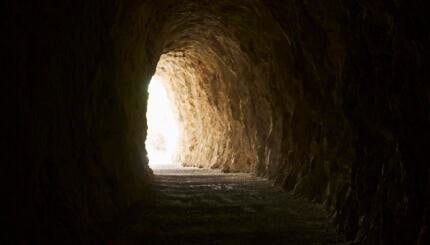What do we do when fear and uncertainty press in and trust feels just beyond reach? How do we meet the difficulties of our lives with faith that something tender lives just beneath the surface?
In Parashat Chukat, the people are thirsty. Again. They cry out in frustration, longing for water, for Egypt, for something easier to bear than the vulnerability and uncertainty of their seemingly unending trek through the wilderness. It’s a familiar refrain. But this time, their complaints come at a fragile moment. Moses’ sister Miriam, summoner of water in the desert, has just died, leaving an aching void in the circle of family and leadership. To sate the people, God tells Moses and Aaron to gather them together and, before their eyes, v’dibartem el ha’sela — speak to the rock and it will bring forth water.
Moses and Aaron do indeed gather the congregation, but rather than speak to the rock, Moses shouts at the people: Shall we bring you forth water from this rock?!! Typically read as an admonishment, his words here seem to tremble with something deeper than anger. The medieval commentator Ibn Ezra suggests this is not a rhetorical question, but a real one. His heart heavy with exhaustion, Moses is asking: Can we really do this? Is this even possible? He then lifts his hand and strikes the rock twice. Water indeed gushes out — but not without cost. The people drink, but the moment is pierced with sorrow. What should have been an act of faith becomes an echo of grief.
Imagining Moses in this troubled state, I wonder if speaking itself was the point — not to command a miracle, but to let words flow, to let feeling flow. Moses does let his feelings flow — but they are directed at the people, and they are expressions of anger and frustration. God was calling him to speak not to the crowd, but to the rock — to the presence of Miriam’s spirit, to the earth, to something that could hold the full weight of the emotions that swirled within him. What if Moses was being called to voice all that he had not yet had a chance to — his grief over Miriam’s death, his fear that his leadership was no longer enough, his weariness from years of carrying a people across dry and uncertain ground? What if, for water to pour forth from the rock, feeling had to first well up within him and pour forth?
With your help, My Jewish Learning can provide endless opportunities for learning, connection and discovery.
Many understand this episode as the reason Moses is barred from entering the promised land. Indeed, God says, “Because you did not trust Me enough to affirm My sanctity before the people, you shall not bring this assembly into the land.” But perhaps Moses’ failure wasn’t simply in striking the rock, but in what that act revealed. Faced with a hard and unyielding surface, he didn’t trust that something life-giving might still flow. The rock may have mirrored his own interior in that moment: sealed shut by grief, worn down by the weight of leadership, hardened by loss. To strike the rock was to reject the possibility that what is closed could be opened, that what is hard can still hold hope. This is why God sees the act as a breach of trust.
A new kind of leadership was being asked for — not one that exerts power over what resists, but one that listens for what still flows within. A new generation, born in the wilderness, needed a guide who — amid exhaustion and challenge, disappointment and grief — could still trust in the life-giving waters waiting beneath every seemingly impenetrable surface.
Every one of us knows this moment. Each of us knows what it is to carry grief in our chest like a stone — heavy, unseen, shaping the way we walk through the world. To feel so overwhelmed, so tender and undone, that we default to force instead of presence. To lash out when what is needed is listening. To hold tight to control when what is needed is connection.
In this time of ongoing political violence and unrest, as the pull of grief, exhaustion and uncertainty grows heavier with each passing day, may we remember: Not everything solid is impenetrable, and not every hard place must be broken open with force. In the places we lead — at home and at work; in the streets and in our sanctuaries; with those we trust and with those with whom we struggle to connect — may we remember to listen closely for what each moment calls forth. To practice presence over reaction and choose words that remind us of our connection rather than actions that shatter. May we have the courage to give voice to what aches within us. And may we trust that beneath what seems unyielding, something living yet stirs. Water wells within rock. Beneath anger live grief and love.



